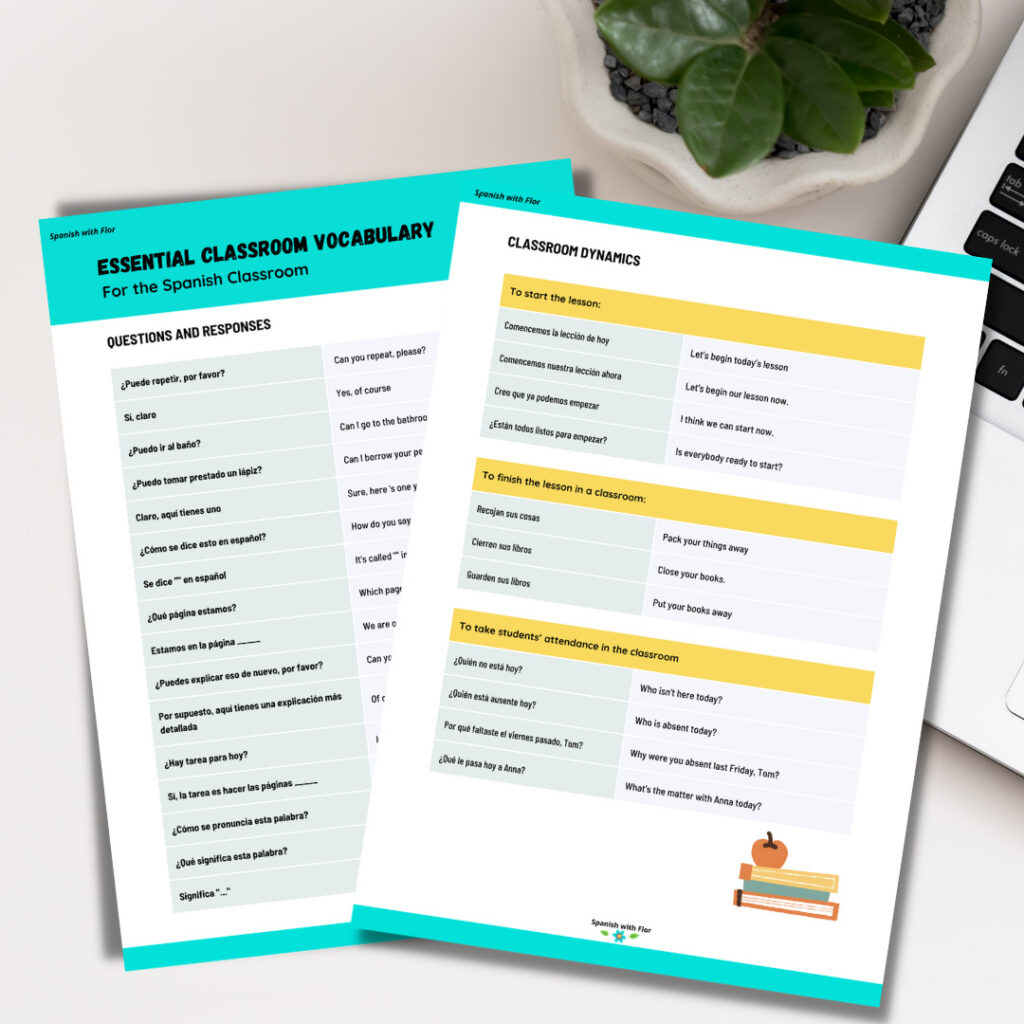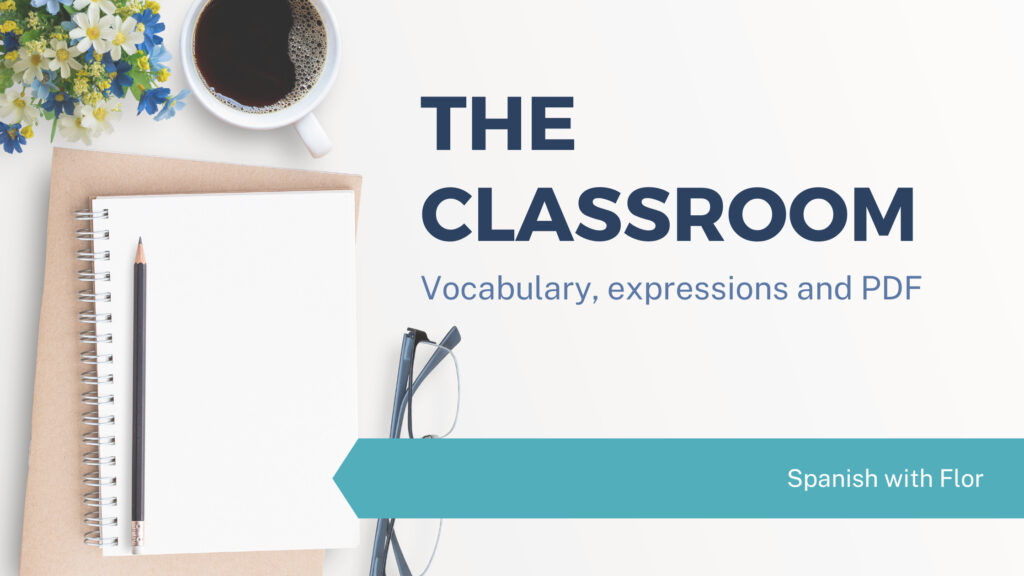Are you ready to embark on a journey to enhance your Spanish language skills?
Whether you’re a beginner or looking to expand your existing knowledge, in this article, we will explore vocabulary used in the classroom setting, complete with examples and English-Spanish translations. By the end, you’ll be well-equipped to communicate effectively in Spanish educational environments.
Essential Classroom Vocabulary
Here’s a selection of essential vocabulary for the classroom
- El Profesor: the Teacher
- Los Estudiantes: the Students
- El Pizarrón: the Blackboard
- Los Libros: books
- El Cuaderno: the copybook
- El Bolígrafo: the pen
- El Lápiz: the pencil
- La Mesa: the table
- La Silla: the chair
- El Reloj: the clock
- La Carpeta: the folder
- La Tiza: a piece of a chalk
- La Goma de Borrar: the eraser
- La Regla: the ruler
- El Sacapuntas: the pencil sharpener
- La Calculadora: the calculator
- El Marcador: the marker
- El Mapa: the map
- La Computadora / El Ordenador: the computer
- El Proyector: the projector
- La Mochila: the school bag
- La Pantalla: the screen
- El Micrófono: the microphone
- El Escritorio del Profesor: the teacher’s desk
- El Borrador: the eraser (for the board)
- El Archivador: the file cabinets
Greetings and Expressions in the class
To create a welcoming and engaging classroom environment, knowing common greetings and expressions is vital. Here are a few:
- ¡Hola!: Hello!
- ¿Cómo estás? (informal) / ¿Cómo está? (formal): How are you?
- Por favor: Please
- Buenos días: good morning
- Buenas tardes: good afternoon
- Adiós a todos: Goodbye, everyone.
- Nos vemos el próximo jueves/ la próxima semana/ mañana/ el lunes: See you again next Thursday/ next week/ tomorrow/ on Monday
- Que pasen / pases unas buenas vacaciones: Have a good holiday.
- Disfruta / Disfruten de las vacaciones: Enjoy your vacation.
- Hasta mañana por la tarde: See you tomorrow afternoon.
- Nos vemos en el aula 8 después del recreo: See you in room 8 after the break.
Numbers and Counting
Numbers play a crucial role in classroom activities. Practice counting in Spanish:
- 1 Uno
- 2 Dos
- 3 Tres
- 4 Cuatro
- 5 Cinco
- 6 Seis
- 7 Siete
- 8 Ocho
- 9 Nueve
- 10 Diez
You can learn more about numbers in this post here!
Subjects and Lessons
As you progress in your Spanish language journey, you’ll need to discuss subjects and lessons:
- Historia (History)
- Matemáticas (Mathematics)
- Ciencia (Science)
- Química (Chemistry)
- Lengua y Literatura (Language and Literature)
- Negocios (Business)
Common tasks in the class
Here are a few common commands in the singular form “tú” for the Spanish lesson:
- Lee: read
- Escribe: write
- Escucha: listen
- Comenta: comment on something
- Une: match
- Responde: answer
- Completa: fill in the blanks
- Elige: choose
- Pregunta: ask
- Habla: speak
- Ordena: put in order
- Subraya: underline
- Mira: look
Questions and Responses
Effective communication in the classroom often involves asking questions and providing answers. Try these:
- ¿Puede repetir, por favor?: Can you repeat, please?
- Sí, claro: Yes, of course
- ¿Puedo ir al baño?: Can I go to the bathroom?
- ¿Puedo tomar prestado un lápiz?: Can I borrow your pencil?
- Claro, aquí tienes uno: Sure, here ‘s one you can borrow.
- ¿Cómo se dice esto en español? : How do you say this in Spanish?
- Se dice “” en español: It’s called “” in Spanish.
- ¿Qué página estamos?: Which page are we looking at?
- Estamos en la página _____: We are on page _____
- ¿Puedes explicar eso de nuevo, por favor?: Can you explain that again, please?
- Por supuesto, aquí tienes una explicación más detallada : Of course, here’s a more detailed explanation.
- ¿Hay tarea para hoy?: Is there any homework today?
- Sí, la tarea es hacer las páginas _____: Yes, the homework is to do pages _____.
- ¿Quién puede responder a esta pregunta?: Who can answer this question?
- Cualquiera puede intentarlo: Anyone can give it a try.
- ¿Cómo se pronuncia esta palabra?: How do you pronounce this word?
- Se pronuncia como “”: It ‘s pronounced like “”.
- ¿Qué significa esta palabra? What does this word mean?
- Significa “”: It means “”.
- ¿Hay alguna pregunta más?: Are there any other questions?
- No, eso es todo por hoy: No, that’s all for today.
Classroom Dynamics
Here you’ll find a few phrases that are very common for different moments of the lesson:
To start the lesson:
- Comencemos la lección de hoy: Let’s begin today’s lesson.
- Comencemos nuestra lección ahora: Let’s begin our lesson now.
- Creo que ya podemos empezar: I think we can start now.
- ¿Están todos listos para empezar?: Is everybody ready to start?
To finish the lesson in a classroom:
- Recojan sus cosas: Pack your things away.
- Cierren sus libros: Close your books.
- Guarden sus libros: Put your books away.
To take students’ attendance in the classroom:
- Who isn’t here today?: ¿Quién no está hoy?
- Who is absent today?: ¿Quién está ausente hoy?
- Why were you absent last Friday, Tom?: ¿Por qué faltaste el viernes pasado, Tom?
- What’s the matter with Anna today?: ¿Qué le pasa hoy a Anna?
To start an activity:
- ¿Están listos? (Plural) / ¿Estás listo? (Singular): Are you ready?
- Todos…: Everybody
- Presten atención todos: Pay attention, everybody.
- Abran sus libros en la página…: Open your books at page…
- Necesitan lápices/reglas: You need pencils/rulers.
- Vamos a aprender a …: We’ll learn how to …
- Tienen cinco minutos para hacerlo: You have five minutes to do this.
- Pasad / Pasen a la página …: Turn to page …
- Mirad / Miren / Mira la actividad cinco: Look at activity five.
- Escucha este audio: Listen to this audio.
- Repite después de mí: Repeat after me.
- Otra vez, por favor: Again, please
- ¿Quién sigue?: Who’s next?
To finish an activity:
- Continuaremos con este capítulo el próximo lunes: We’ll continue this chapter next Monday.
- Practicaremos un poco más en la próxima clase: We’ll do some more practice of this in the next class.
- Terminaremos este ejercicio la próxima clase: We’ll finish this exercise next lesson.
- Continuaremos con esto mañana: We’re going to continue with this tomorrow.
Download the PDF list with all the expressions and phrases here!

Are you learning Spanish for the first time?
Join the Basic Spanish Course Online!


